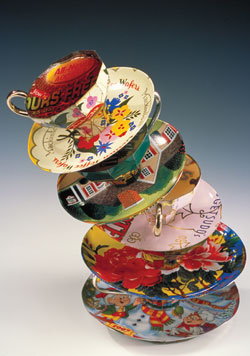Fall 2012: 'Consuming Conversation' by Harriete Berman at Kimura Gallery
by Kathleen McCoy |
Exhibit dates:
Monday, Aug 27-Friday, Sept 28
Opening Reception:
Monday, Aug. 27, 5:30-7:30 p.m.
Kimura Gallery, 2nd floor, Fine Arts Building
Free parking at the Fine Arts Building beginning at 5 p.m.
 Image:
Image:
These stacked cups and saucers are from a series titled Consuming Conversation, a variant edition of 200 cups constructed from recycled tin cans (2001-2003). Each
cup has a different product identity symbolizing the American pastime of shopping
as social interaction and entertainment. On the top of each cup are words or comments
inspired by advertising. Each letter is cut from various tin cans. Tinted resin fills
each cup to almost overflowing as if it were filled with "tea," a metaphor for the
overabundance in our society. A concealed rod holds each stack of cups together in
a precarious position reflecting our current economy of overspending and consuming
without regard to realistic finances.
Artist's Statement:
- What does it mean to make a manufactured object by hand to look like a real appliance?
- What messages permeate our consumer society about beauty and standards of perfection?
These queries were first illustrated in "The Family of Appliances You Can Believe In," a group of domestic appliances started in 1980. These appliances, as well as the work to come later, use humor and fine craftsmanship (along with autobiographical content) to comment on issues regarding the roles of women in our society, American consumerism and the art world. The irony of handmade objects replicating the status symbols of manufactured domestic appliances is an imprtant aspect of their cultural meaning.
As an artist, wife and mother suffocating in "domestic bliss," my work entwines the mundane of everyday life with the relentless messages of "satisfaction guaranteed." The second-class status of women who care for home and children parallels the second-class perception of craft and handmade objects in the art world.
Starting in 1980 my work changed radically to use recycled tin cans from consumer packaging to construct multiple frames portraying women in a number of stereotypical roles. The series, The Deceiver and The Deceived, utilizes a fan quilt pattern. The arrangement of the women alludes to the strong connection between traditional quilt patterns as "women's work" and the home. The fan quilt pattern also refers to the use of fans in western society gatherings as a device of flirtatious deception. The relentless messages conveyed in media and advertising about a woman's appearance reveals a questionable aspect of our consumer culture. Who is the deceiver and who is the deceived in our society when women are portrayed as "pure, alluring, refershing and delicious, good as homemade?"
 "Fall 2012: 'Consuming Conversation' by Harriete Berman at Kimura Gallery" is licensed under a Creative Commons Attribution-NonCommercial 4.0 International License.
"Fall 2012: 'Consuming Conversation' by Harriete Berman at Kimura Gallery" is licensed under a Creative Commons Attribution-NonCommercial 4.0 International License.









